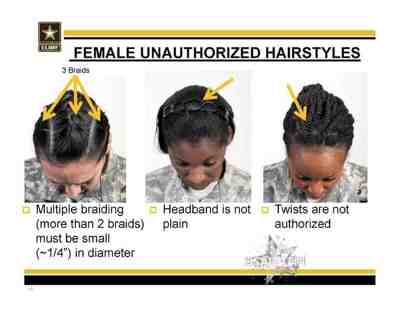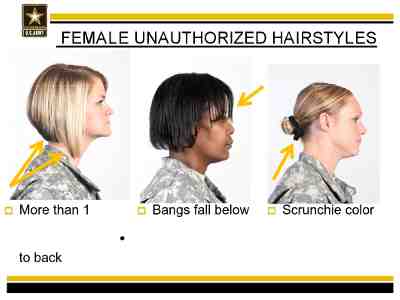Black women cry foul over Army’s new grooming standards
Army’s new grooming standards ignite firestorm
WASHINGTON — The Army’s new grooming standards have ignited a firestorm mainly among black women who allege that the updated grooming standards are discriminatory.
According to Army Regulation 670–1 Wear and Appearance of Army Uniforms and Insignia, which was last updated on March 31, 2014,
The requirement for hair grooming standards is necessary to maintain uniformity within a military
population. Many hairstyles are acceptable, as long as they are neat and conservative. It is the responsibility of leaders at all levels to exercise good judgment when enforcing Army policy. All Soldiers will comply with hair, fingernail, and grooming policies while in any military uniform, or in civilian clothes on duty.Jobs from Indeed
It seems that black females have been most critical of the new standard. Sgt. Jasmine Jacobs of the Georgia National Guard, for example, currently wears her hair in a style of two twists. That style is not acceptable, according to the new grooming standards.
Jacobs claims that her hair does not interfere with her head gear and has started a petition. Other female black personnel have also come forward, such as Staff Sgt. Mary Johnson, with similar concerns.
Is the policy really discriminatory, or is it simply a matter of certain women being against conforming to a hairstyle because they just don’t want to? The photos that have been widely circulated, which are shown in the first set below, are only a small portion of the photos that the Army has released in their Uniform Leaders Policy Manual which was updated on March 18, 2014.
What is not being given equal exposure is this photo,
In the photo above, the hairstyles do not meet Army grooming standards because the hair is either more than one length, the length of bangs is too long or, as the third photo above depicts, simply does not meet standards because the scrunchie color is not a similar color to the hair.
Should a woman who feels her hair behaves best when sporting a two-length hairstyle start a petition because she does not believe that her hair style interferes with her ability to perform her job?
Using the latter example, should a person of any race that regularly used a contrasting color scrunchie start a petition because she likes to wear a contrasting color scrunchie and does not believe it impedes her ability to perform her job? Ditto for the bangs.
While it’s true that black women with untreated hair tend to have frizzy, coarse hair, many women of other races have coarse hair as well.
That is why the Army has a wide array of acceptable styles for females that have short, medium or long hair that can be worn by any woman of any race. Some of the styles include braids, secured in a bun or utilizing a head band to ensure compliance with the high standards that the Army has set in order to maintain, “uniformity” within a military population.
I, for one, truly appreciate the service that our men and women in the military perform in protecting our country. It just seems that the hair issue is a bit frivolous.
Related articles








 Follow
Follow

